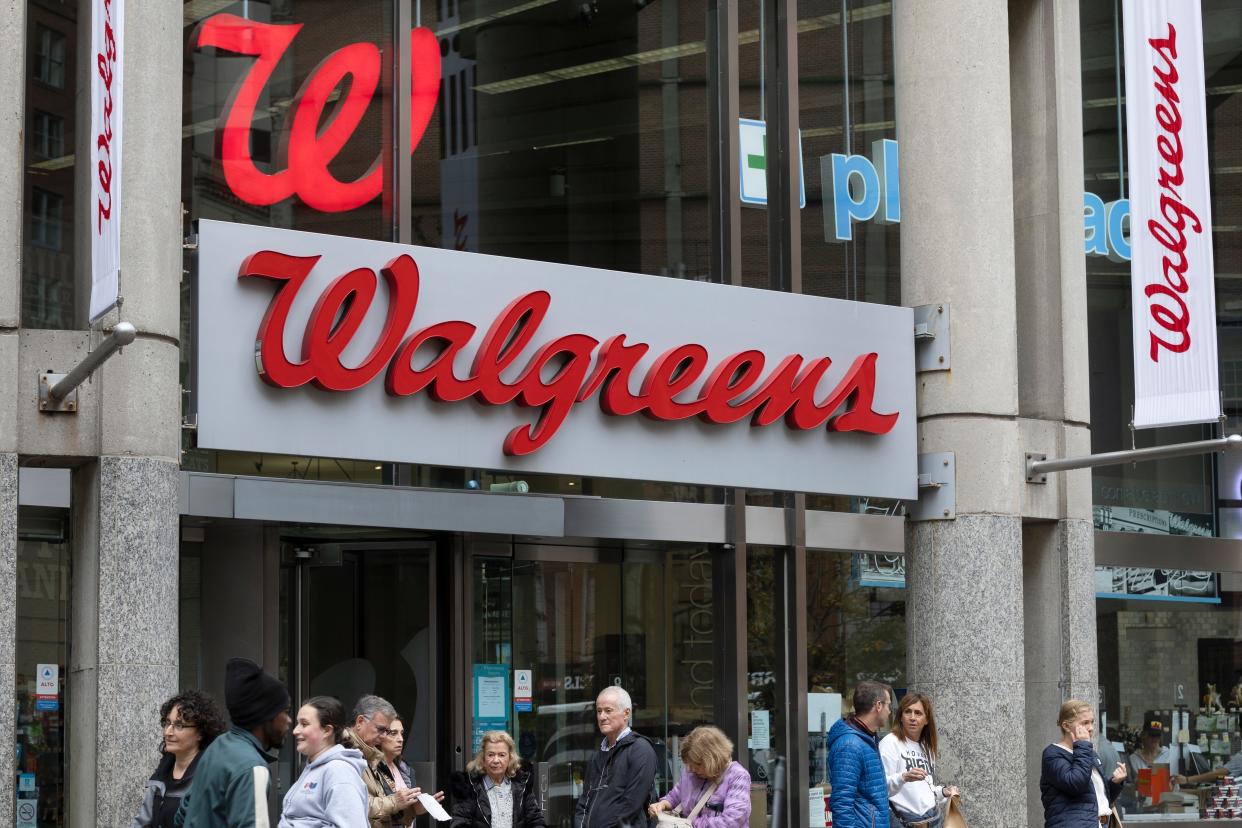Walgreens pharmacists stage walkout just weeks after similar action by CVS staffers

- Oops!Something went wrong.Please try again later.
Just two weeks after dozens of CVS pharmacists protested unsafe working conditions by walking off the job in Kansas City, Walgreens pharmacists followed suit with their own walkout Monday that left stores shuttered or short-staffed across the nation’s second-largest retail pharmacy chain.
The organizer estimated that several hundred pharmacists and pharmacy technicians participated in the protest, which will last through Wednesday.
Walgreens spokesman Marty Maloney downplayed the impact of the walkout as “minimal"
A "small number of our pharmacies are experiencing disruptions, and we apologize for any inconvenience," Maloney said. "We are working to return these pharmacies to regular operations as quickly as possible. Nearly all of our 9,000 locations continue to serve our patients and customers."
USA TODAY interviewed several Walgreens pharmacists and pharmacy technicians participating in the walkout, all of whom requested anonymity for fear of retaliation. They echoed concerns shared by CVS pharmacists when they walked out in late September. Among them: the company places unreasonable demands on pharmacy workers without providing the staffing or resources to do their jobs safely or ethically.
In addition to filling and verifying prescriptions, Walgreens pharmacists also must manage a large volume of patient calls; perform rapid flu and COVID-19 testing; work with insurance companies on such issues as approvals, co-pays and reimbursements; and provide an increasing number of vaccinations, including COVID-19, flu, pneumonia and shingles.
Staff are pressured to hit targets and disciplined for falling short, they said. As a result, corners are cut and medication errors are on the rise, putting patients at risk.
“We want patients before profits,” said the walkout organizer, who has worked for Walgreens for more than a decade. “The company has cut hours drastically while continuing to pile more work and new programs on top of us. Customers are not being taken care of. Our patients are not being cared for. It is not safe.”
The fast pace, the organizer said, has led to an uptick in medication errors behind the pharmacy counter and an increase in accidental needle sticks during vaccinations.
In a statement to USA TODAY, Walgreens acknowledged that the last few years have been challenging for its staff and required an “unprecedented effort” to provide vaccines, fill prescriptions and perform health screenings amid the pandemic.
“We also understand the immense pressures felt across the U.S. in retail pharmacy right now,” Maloney said. “We are engaged and listening to the concerns raised by some of our team members. We are committed to ensuring that our entire pharmacy team has the support and resources necessary to continue to provide the best care to our patients while taking care of their own wellbeing. We are making significant investments in pharmacist wages and hiring bonuses to attract/retain talent in harder to staff locations.”
During the CVS walkout, corporate staff flew into Kansas City to meet with organizers and agreed to a series of changes to improve working conditions and patient safety, including additional staffing and paid overtime. Prem Shah, CVS' chief pharmacy officer and president of pharmacy and consumer wellness, also issued a memo to Kansas City staff apologizing for not responding sooner to their concerns.
More: CVS walkout ends; pharmacists cautiously optimistic amid promises of more staff and relief
Walgreens employees participating in the walkout said they seek three concessions from the company: transparency in how staff hours are allocated, dedicated training time for each new hire and a reconfiguration of quotas.
Currently, they told USA TODAY, Walgreens assigns each store a set of quotas based on how much staff they should have instead of how much staff they actually have. As a result, they said, short-staffed stores scramble to keep pace with unreasonable demands and are held accountable for falling short.
In essence, they said, they are set up to fail.
The Walgreens walkout reflects a rising tide of dissatisfaction among retail pharmacists nationwide who for years have complained about short staffing levels combined with the rising pressure of corporate performance metrics.
That pressure intensified during the pandemic, when pharmacists also were required to administer back-to-back COVID-19 tests and vaccinations.
“I was asked recently, ‘Why would you want to close the pharmacy for a few days; that’s not good for patients,” said one of the Walgreens pharmacists participating in the walkout. “I think a lot of pharmacists haven’t done it because we don’t want to cause harm. But are we going to cause harm all day every day? Or are we going to inconvenience people for a few days in a way that might evoke change?”
If you're a retail pharmacist who would like to share your story with USA TODAY, please email investigative reporter Emily Le Coz at elecoz@usatoday.com.
This article originally appeared on USA TODAY: Walgreens walkout shutters stores as pharmacists protest working woes

